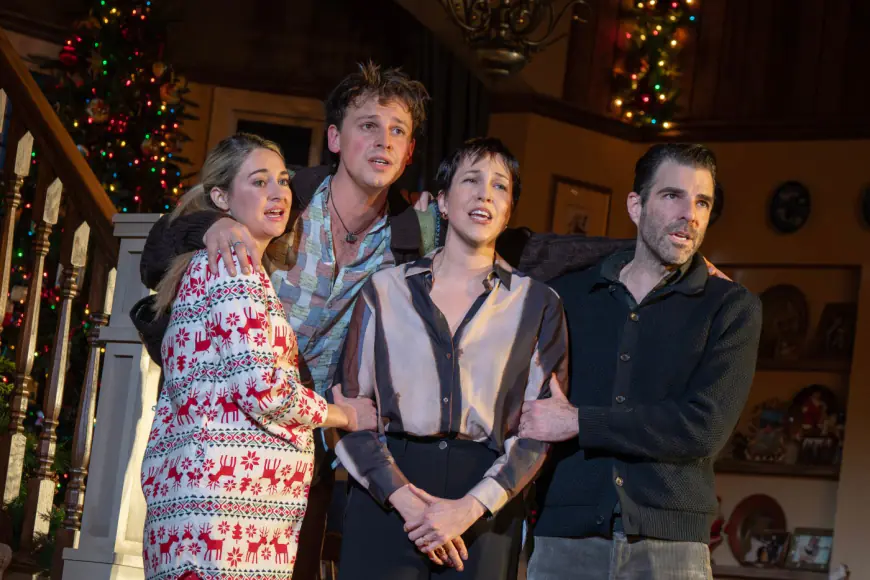BROADWAY REVIEW: Shailene Woodley leads strong cast of intense family dysfunction play ‘Cult of Love’
Just in time for Christmas comes Leslye Headland's familial hellscape 'Cult of Love," a caustically funny portrait of seasonal dysfunction.

Just in time for Christmas comes Leslye Headland‘s familial hellscape, a caustically funny portrait of seasonal dysfunction that sticks a pair of fundamentalist Christians, a sardonic Jew, two defiantly agnostic lesbians, drug addicts of various flavors, a failed priest turned failing lawyer and a dad fighting dementia all under the same roof. And they all sing in harmony with their meandering, manipulative mom, too.
Every sweet, wretched note in “Cult of Love” is underscored with agony. Happy holidays from Second Stage!
The idea of bringing warring adult siblings back to the seat of their discontent on a high-pressure occasion is, of course, one of the American theater’s most enduring devices. And, indeed, “Cult of Love” owes much to Tracy Letts’ “August: Osage County,” Branden Jacob-Jenkins’ “Appropriate” and even that famous meal scene in the TV show “The Bear,” not to mention countless other plays by the likes of Anton Chekhov and Horton Foote. Playwrights often have issues with their families, and it’s usually no fun when your progeny starts tapping out plays, either.
But what makes “Cult of Love” different, and distinctive, is not just the intensity of the inter-family battles it creates but how much it foregrounds its Christmas setting.

Unlike some of her peers, Headland knows how to write striving middle-class characters born of suburban discontent rather than privilege. Many chroniclers of sibling and child-parent wars are focused on, well, precisely that. Headland, though, is more interested in what holds a family together rather than in what pulls them apart, although she stocks her 100-minute, single-scene, real-time play with countless examples thereof.
Still, at its core. “Cult of Love” is an exploration of its own title. Its central question is why do we hang out with family we don’t like at Christmas, or who don’t approve of us?

Many will be the person sitting in the Hayes Theater watching this show, I suspect, who will have at some point wondered whether it’s worth enduring the potential for offense or pain of family gatherings, especially when the family in question belongs to a spouse. Never again, one often says. Not worth it. No point. Not next year.
But then most of us usually go back anyway. And it’s not for her figgy pudding.

We’re pulled, in Headland’s telling, by a weird mix of mythological pressure, Darwinian logic, residual altruism, childhood regression and (most importantly) raw personal need. She argues here, and very well too, that to be loved is so fundamental a human need that we are willing to put ourselves in the most abrasive blender imaginable with any related person actually willing to do the loving. Even though we loathe every seasonal swirl and whirl.
That seasonal setting of “Cult of Love” has another resonance, too. The holiday season is prime time for moralizing plays; you know, where bankers and hedge-fund types sit there and pretend to listen to the wise ghost of Jacob Marley.

That’s in play here, too, and there are times in Trip Cullman’s very present and very savvy production when it feels like you are actually watching a Judeo-Christian Christmas ghost story with the Baby Jesus or an Old Testament prophet about to make an appearance, or at least some Ghost of Christmas Past showing up with sawdust to sprinkle to promote the belated acceptance of personal difference. The play actually discusses Christianity quite specifically and in a very nuanced way. That’s unusual in Broadway satires, and the play is all the better for having the guts to do so.
This kind of show needs a cast willing to dive headlong into the curdling eggnog (or, specifically here, a vat of premade Manhattans to null the pain) and Cullman has the right crew, with Mare Winningham and David Rasche playing the flailing parents. The excellent Shailene Woodley pulls off the toughest assignment as the prophetic (or mentally ill) daughter, but Zachary Qunto, Rebecca Henderson and Christopher Sears all forge empathetic beasts. Barbie Ferreira, Roberta Colindrez, Christopher Lowell and Molly Bernard play the mostly bewildered in-laws and partners in crime, giving as good as they get and yet still getting drawn into the dysfunctional love cult of the title.

Some of the characters (and their costuming) are, perhaps, a bit too much to type, but then this is a satire, at least partly dependent on such. And as beautifully lit by Heather Gilbert, the deceptively rich set from John Lee Beatty morphs from a typically decorated Connecticut house to a kind of purgatory from which none of these characters, it becomes clear, can ever leave, however fervently they rail against their lot.
There’s caroling, sure, but no exit.
What's Your Reaction?








































































































